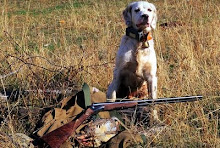
If you think about it a bit, you realize that a 'breed' is an arbitrary boundary drawn around a 'type' of dog - usually with shared ancestors that more or less define the gene pool.
The unfortunate aspect of this is that the Darwinian component that constrains the passing of non-functional genetic traits has been removed from our domestic dogs. So any dog, no matter how dysfunctional, has a chance to pass its genes along in the gene pool.
Breed clubs have tried to make the decisions that would imitate, in some ways, the natural pruning that Darwinian evolution does in nature. Mostly, they fail.
In my mind, the point of a sporting breed (or herding, or other working breeds) is performance of the work tasks they are given. Dogs have a richer genetic tapestry than humans - they are more dependent on innate abilities and characteristics than we are. So breeding must be tempered by culling based on performance. Without breeding based on performance, we are letting breeds go in the wrong direction.
Does it really matter? I would argue that it should matter to people who want their dogs to be intelligent, physically capable and trainable. Defining a gene pool (provided it is large and diverse enough to sustain breeding that is true to type) is useful when the breeder is striving for consistency and improvement in dogs when line breeding. There must, however, be enough genetic diversity within the type to sustain breeding for many generations without the effects of inbreeding.
On the other hand, I have no problem with those who, for a number of reasons, are trying to change or resurrect a type of dog (as was done with the field bred red setters) and who go outside the breed boundaries for contributions to type. THIS IS THE WAY ALL MODERN BREEDS HAVE BEEN DEVELOPED.









No comments:
Post a Comment